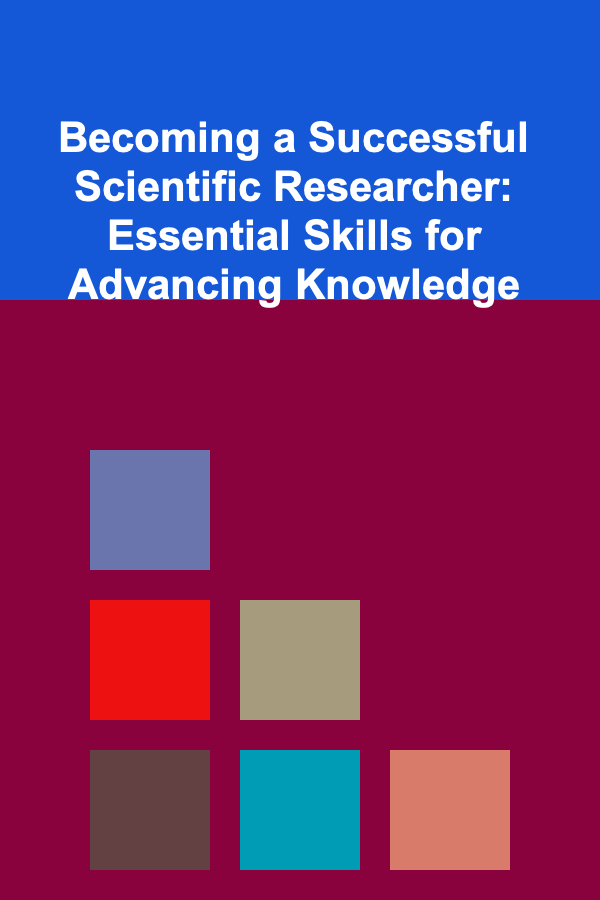
Becoming a Successful Scientific Researcher: Essential Skills for Advancing Knowledge
ebook include PDF & Audio bundle (Micro Guide)
$12.99$6.99
Limited Time Offer! Order within the next:

Becoming a successful scientific researcher is a journey that demands more than just technical expertise and a passion for discovery. It requires a multifaceted set of skills and attributes that extend beyond the laboratory or the academic paper. As scientific fields evolve and become increasingly interdisciplinary, researchers are tasked not only with conducting experiments but also with effectively communicating their findings, collaborating across domains, and navigating the challenges of modern research landscapes. This actionable guide provides a comprehensive roadmap for researchers aspiring to leave a lasting impact on their fields and advance knowledge in meaningful ways.
Cultivating the Right Mindset
Success in research is deeply tied to the mindset a researcher adopts. A positive, growth-oriented mindset not only fuels perseverance in the face of setbacks but also shapes the direction and impact of one's work.
Intellectual Curiosity and Lifelong Learning
The foundation of successful research lies in intellectual curiosity. Researchers must be deeply driven by a desire to understand the underlying mechanisms of phenomena, whether in biology, physics, social sciences, or any other field. This passion for discovery should never fade, no matter how experienced you become.
- Ask Big Questions: To truly push the boundaries of knowledge, pose questions that have not been answered or those that challenge existing paradigms. Great researchers seek to understand the "why" and "how" behind phenomena rather than just observe the "what."
- Embrace New Learning Opportunities: The world of research is constantly evolving with new methodologies, tools, and technologies. Make it a point to stay current by attending workshops, taking courses, and engaging with new research methods that could enhance your work.
- Foster Interdisciplinary Thinking: Innovation often arises at the intersections of disciplines. Being open to learning from fields outside of your own can provide fresh perspectives and spark creative approaches to your research.
Resilience in the Face of Failure
Science is a field full of uncertainty, and most experiments or hypotheses do not result in immediate success. A resilient researcher can handle setbacks without losing motivation.
- Accept Failure as Part of the Process: In research, failure is inevitable. However, each failure provides valuable insights that can refine the research process. Learn to interpret negative results as stepping stones toward eventual success.
- Iterate and Adapt: Research is a cycle of constant refinement. Be flexible in your approach and willing to pivot when new data or feedback suggests a different direction. Adaptability is a hallmark of great researchers.
Analytical Rigor and Skepticism
Being analytical and skeptical of results---whether your own or others'---is critical for maintaining the scientific integrity of your work. Critical thinking is not just about applying methods rigorously but also about questioning assumptions and considering alternative explanations for observed phenomena.
- Critique Your Own Work: Don't take your conclusions at face value. Assess whether the data truly supports your hypotheses, and consider potential sources of bias.
- Challenge Conventional Wisdom: It's easy to follow established theories and methods, but true breakthroughs often happen when researchers question long-standing assumptions and explore new, unconventional ideas.
Mastering Research Design and Methodology
A successful scientific researcher is not just knowledgeable but also skilled in designing robust and methodologically sound research. The strength of any scientific finding lies in how well the research was conducted.
Formulating Clear Research Questions
Before diving into the details of methodology, researchers must first ask clear and focused questions. Without a well-defined question, research can become aimless, and results may lack the clarity needed for significant impact.
- Define the Scope: A good research question is specific, measurable, and answerable. It should address a gap in the existing literature and have practical implications for the field.
- Think About the Impact: While formulating questions, consider how the research will advance knowledge or contribute to real-world problems. A question that addresses a current issue, whether it be in health, technology, or society, can elevate the impact of your work.
Selecting the Right Methodological Framework
Choosing the right methodology is vital for ensuring the validity and reliability of research findings. Researchers must align their methods with their research questions and ensure that their approach is both appropriate and feasible.
- Be Methodologically Rigorous: Whether using qualitative, quantitative, or mixed methods, ensure that your methodology is transparent, reproducible, and robust. Proper sampling, data collection, and analysis methods are key to generating valid results.
- Stay Current on Research Methods: Techniques and tools for data collection and analysis evolve rapidly. Familiarize yourself with emerging technologies such as machine learning, statistical modeling, or genome editing that may revolutionize the way you conduct your research.
- Ensure Ethical Integrity: Ethical considerations are fundamental in all research. Ensure that your research adheres to ethical guidelines, whether it involves human subjects, animal testing, or environmental concerns.
Statistical Analysis and Data Interpretation
Today's research often generates large datasets that require advanced statistical techniques for proper interpretation. A strong grasp of statistics is crucial for making accurate inferences and ensuring that findings are scientifically valid.
- Learn Statistical Methods: Familiarize yourself with techniques such as regression analysis, hypothesis testing, and multivariate analysis. A solid understanding of statistical tools allows for deeper insights and more robust conclusions.
- Prioritize Data Visualization: Effective data visualization helps communicate complex findings more clearly. Tools like R, Python, or specialized software like Tableau can aid in presenting data in visually accessible ways that make it easier for both experts and non-experts to understand your findings.
Effective Communication and Dissemination
Being a successful researcher isn't just about doing great work in the lab---it's also about effectively sharing your findings with others. The ability to communicate complex ideas to different audiences is critical for advancing knowledge and influencing both the scientific community and the broader public.
Publishing in High-Impact Journals
One of the primary ways to disseminate research is through publication. A well-crafted research paper in a respected journal ensures that your findings reach a global audience and contribute to the scientific dialogue.
- Choose the Right Journal: Select journals that align with your research topic and audience. High-impact journals often have stringent peer-review processes, ensuring that only well-conducted, high-quality research is published.
- Craft Clear and Concise Papers: A successful research paper should be clear, concise, and accessible. Write with precision, focus on your main findings, and avoid unnecessary jargon that could hinder comprehension.
- Engage with Peer Review Constructively: Peer review is an essential part of the publication process. Respond to reviewers' comments thoughtfully and use their feedback to improve the quality of your paper.
Presenting at Conferences and Networking
Scientific conferences are a prime opportunity to share research findings with peers, receive feedback, and expand your professional network. Attending and presenting at conferences provides a platform for engaging with the wider research community.
- Prepare Effective Presentations: Whether presenting a poster or giving a talk, the way you communicate your research matters. Focus on key findings and their implications, and ensure your presentation is visually engaging and easy to follow.
- Engage with Fellow Researchers: Conferences are an ideal venue for networking and forging collaborations. Make an effort to connect with researchers from different fields to expand your knowledge and open new avenues for future work.
Using Digital Platforms for Outreach
In today's digital age, social media and other online platforms provide powerful tools for disseminating research and engaging with a broader audience.
- Engage with Public Platforms: Use platforms like Twitter, LinkedIn, and ResearchGate to share your research, interact with other scientists, and follow discussions in your field.
- Write for the Public: Writing for popular science outlets, blogs, or newspapers can help make your research accessible to non-scientific audiences and raise public awareness about the importance of your work.
Building a Research Career
Building a successful career as a researcher requires more than just producing papers. It involves strategic career planning, effective mentorship, and an ability to navigate the often-complex landscape of academic and industry positions.
Seeking Funding and Grants
Research funding is essential for pursuing meaningful projects, but securing funding can be one of the most challenging aspects of a research career. Building a portfolio of successful grant applications is crucial.
- Write Compelling Grant Proposals: Craft clear, well-structured proposals that demonstrate the significance of your research, its potential impact, and your ability to carry it out.
- Diversify Funding Sources: Explore multiple avenues for funding, including government grants, private foundations, and industry partnerships, to support different stages of your research.
Mentorship and Collaboration
Mentorship plays a critical role in shaping a researcher's career. Strong mentors provide guidance, support, and advice that can help researchers navigate challenges and avoid common pitfalls.
- Find a Mentor: Seek mentors who can offer valuable insights into both your research and your career development. Their experience and networks can provide opportunities and advice that will shape your trajectory.
- Foster Collaborative Relationships: Collaboration is key in today's interdisciplinary research environment. Building strong partnerships with researchers from different fields can open new perspectives and lead to exciting projects.
Conclusion
Becoming a successful scientific researcher is a complex and dynamic process that requires a combination of intellectual curiosity, technical skills, effective communication, and strategic career development. By continuously refining your mindset, research methodology, and dissemination strategies, you can advance knowledge in meaningful ways and make a lasting impact on your field. The road to success is long, but with dedication, resilience, and a focus on continual growth, you can achieve your research goals and contribute to the broader scientific community.

How to Find a Kiplinger Financial Advisor to Optimize Your Financial Strategy
Read More
How to Incorporate Industrial Lighting into Your Home Decor
Read More
How to Maintain a Rental Property on a Budget
Read More
How to Manage Finances When You're Living Paycheck to Paycheck
Read More
How to Renovate Your Home to Improve Indoor Air Quality
Read More
How to Use a Trolley for Mobile Music Supplies
Read MoreOther Products

How to Find a Kiplinger Financial Advisor to Optimize Your Financial Strategy
Read More
How to Incorporate Industrial Lighting into Your Home Decor
Read More
How to Maintain a Rental Property on a Budget
Read More
How to Manage Finances When You're Living Paycheck to Paycheck
Read More
How to Renovate Your Home to Improve Indoor Air Quality
Read More